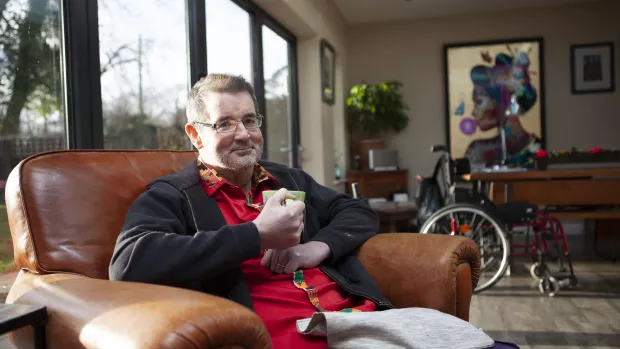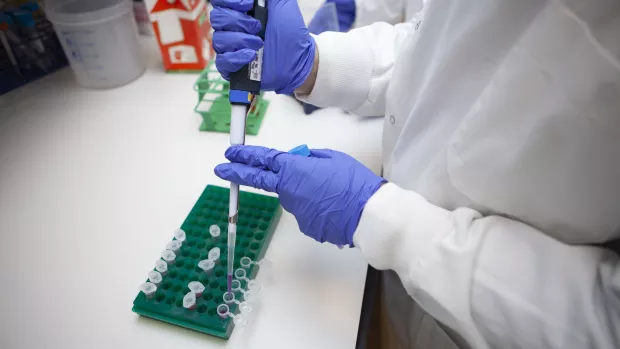
Trial for people with advanced progressive MS recruiting now
ChariotMS will test whether a drug called cladribine can slow down the worsening of hand and arm function for people with more advanced progressive MS.
There are currently no disease modifying therapies (DMTs) available for people with MS who can't use their lower limbs at all, or can only walk short distances using aids like crutches.
In MS clinical trials, walking ability has traditionally been the main measurement of whether a drug is effective. So many people who use wheelchairs have been unable to take part.
ChariotMS is changing that. And we've committed to raise £370,000 to support the study.
Who can take part in ChariotMS?
The team will recruit 200 participants who score between 6.5 and 8.5 on the Expanded Disability Status Scale (EDSS). This means some people who have never been eligible for a trial before will be able to take part.
If you think you might be eligible, get in touch with your neurologist or MS nurse about a possible referral, or email the trial team at [email protected].
ChariotMS and COVID-19
The trial team is working hard to make sure the COVID-19 pandemic does not jeopardise their plans. As DMTs affect your immune system, they can increase your chances of infection, or complications from infection. These risks are different for different DMTS, but generally they are moderate. The Association of British Neurologists currently say that cladribine can be used “cautiously”.
What is ChariotMS testing?
ChariotMS will test whether a drug called cladribine can slow down the worsening of hand and arm function for people with advanced MS. Cladribine was originally developed for cancer and is already used to treat highly active relapsing MS.
This is the first trial of a potential DMT that focuses on people with advanced MS, regardless of whether their MS is primary or secondary progressive. And the first with no upper age limit.
Instead of using walking ability to determine whether the drug is effective, the trial will use a task called the Nine Hole Peg Test. This test measures how hand and arm function changes over time.
Why are researchers hopeful about cladribine?
Like all DMTs, cladribine is what we call an immunomodulatory drug. It stops the immune system mistakenly damaging the protective coating around our nerves. But unlike some other DMTs, it can actually get inside the brain and spinal cord. This helps cladribine be so effective for relapsing MS.
Traditionally, researchers thought this type of treatment wouldn’t work very well in more advanced MS, because for these people damage is less likely to be caused by immune activity. But recent evidence suggests tackling the immune system with a drug like cladribine may actually still be effective.
Professor Klaus Schmierer, from Queen Mary University of London and Barts Health NHS Trust, is leading the trial. He says: “Finding ways to maintain people’s upper limb function is essential to their quality of life, but until now walking ability has been the only official measurement of whether or not an MS treatment is effective. This has excluded people who depend on a wheelchair from taking part in trials and, as a result, from accessing effective treatment that will help maintain their hand and arm function.”
Read some of the early data suggesting cladribine may help treat progressive MS
A powerful partnership
ChariotMS has been made possible by government, charity and commercial funders coming together. It's funded by the Efficacy and Mechanism Evaluation programme, a partnership between the Medical Research Council and National Institute for Health Research. It also receives funding from the company who produce cladribine – Merck Serono – and Barts’ Charity, the National MS Society in the US and us.
Dr Emma Gray, our Assistant Director of Research says: “More than 130,000 people live with MS in the UK, and those with more advanced forms can experience difficulty with walking, relying on mobility aids like walking sticks and wheelchairs to help. But as MS progresses, many go on to experience problems with their hand and arm function too – and treatment options start to disappear.
"Preserving hand and arm function would unquestionably improve the quality of life of people with MS, helping them to live more independent lives. That’s why we’re so thrilled to help make this important trial a reality.”
Get involved in ChariotMS
If you score between 6.5 and 8.5 on the Expanded Disability Status Scale (EDSS) get in touch with their neurologist or MS nurse about a possible referral. Or email the trial team at [email protected]



